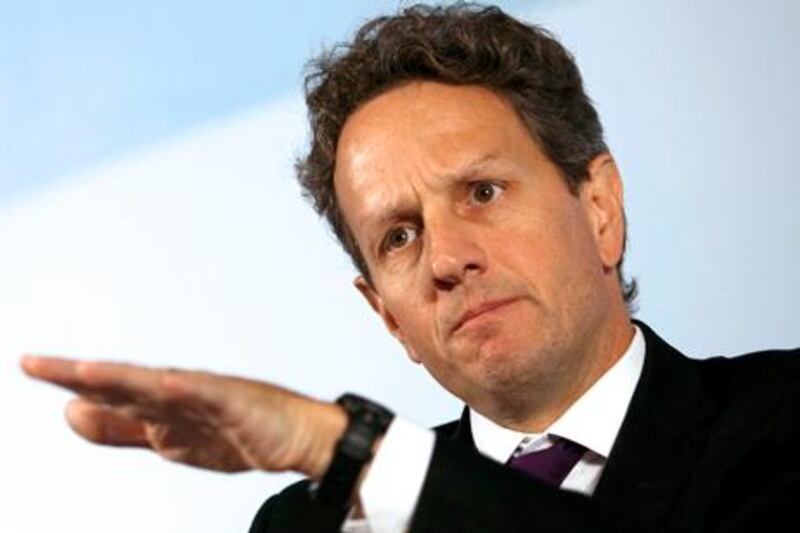Timothy Geithner, the US Treasury secretary, visited Abu Dhabi yesterday on his way to the G20 meeting in South Korea, where a battle over currency valuations, trade imbalances and new US economic stimulus will be at the top of the agenda.
Mr Geithner, a key architect of the US bailouts of financial institutions and the overarching response to the global financial crisis, came to the capital to discuss "broad developments in the global economy and regional issues of mutual concern", according to a Treasury statement.
Analysts say the visit may be a gesture of thanks for the UAE's co-operation on geopolitical issues and with recent US efforts to impose additional economic sanctions on Iran.
But US officials could also be seeking the UAE's input on global economic issues. Saudi Arabia is the only Gulf nation in the Group of 20 (G20) leading and emerging economies.
"The weakening of the dollar will be of concern to countries like the UAE, whose currencies are of course pegged to the US dollar and so will be directly impacted by the Fed's move," said Ghanem Nuseibeh, a partner at Cornerstone Global Associates and senior analyst with Political Capital.
"As the UAE is not part of the G20, it will be important for the US to ensure it has engaged countries like the UAE ahead of the meetings in Seoul."
Iran, an age-old trading partner of the UAE, may also be on the agenda.
The UAE has recently put renewed pressure on Iranian banks and businesses, with a special emphasis on those with ties to the country's powerful Revolutionary Guard.
The UAE Central Bank froze dozens of bank accounts controlled by Iranian businesses in June, according to a circular sent to lenders.
Dozens more businesses have been shut down by UAE authorities as the US tries to tighten the screws on Iran's government and prevent it from possibly developing a viable nuclear weapons programme.
"It is also certain that he will discuss the effectiveness of the Iranian sanctions and their impact on the UAE economy, which UAE officials may be keen to raise," said Mr Nuseibeh. "The UAE's role on enforcement of the sanctions is something the Americans will be particularly pleased about."
Mr Geithner had talks with Sheikh Mohammed bin Zayed, Crown Prince of Abu Dhabi and Deputy Supreme Commander of the UAE Armed Forces.
Also taking part were the UAE Foreign Minister Sheikh Abdullah bin Zayed, the Governor of the Central Bank Sultan al Suwaidi, and Obaid Humaid al Tayer, the Minister of State for Financial Affairs.
The US Embassy in Abu Dhabi declined to reveal more details about the private meetings, which took place in a three-hour afternoon stopover on Mr Geithner's tour of Asia and the Middle East. He left Abu Dhabi for Singapore later in the day.
As the G20 meetings near, the UAE and other Gulf oil producers are watching closely for signs of how global economic trends might affect the region.
The US recently started a new round of so-called quantitative easing (QE), a process through which its central bank is effectively pumping $600 billion (Dh$2.2 trillion) of new currency into the domestic economy.
That, economists say, should work mostly to the benefit of Gulf countries as investors and businesses put the new money into higher-growth markets in Asia, South America and the Middle East.
But there are risks that the Gulf may benefit less from QE than other emerging markets because of restrictions on foreign investments and fewer good investment opportunities.
"QE from the Fed is going to filter into emerging markets through various channels, and this is not different for the Middle East and North Africa," said Turker Hamzaoglu, an economist at Bank of America Merrill Lynch.
"But we think that the benefit of this positive spillover is going to be less pronounced in MENA compared to the broader emerging markets."
Leaders in Seoul will not address proposals to limit trade surpluses and deficits to 4 per cent of GDP to correct imbalances in the global flow of goods and capital. Such moves could have a big impact on the Gulf, given its large trade surpluses from oil exports.
But perhaps the biggest issue weighing on Gulf countries is the shaky global economic recovery, given that high oil prices depend on healthy foreign demand.
GCC countries are also concerned about recent weakness in the US dollar, which is eroding the buying power of oil revenues, even though prices have recently stayed above US$80 a barrel. All Gulf currencies apart from Kuwait's are pegged at fixed exchange rates with the dollar.





